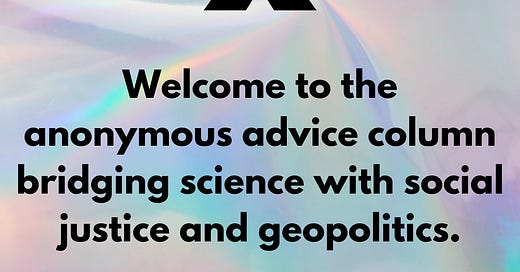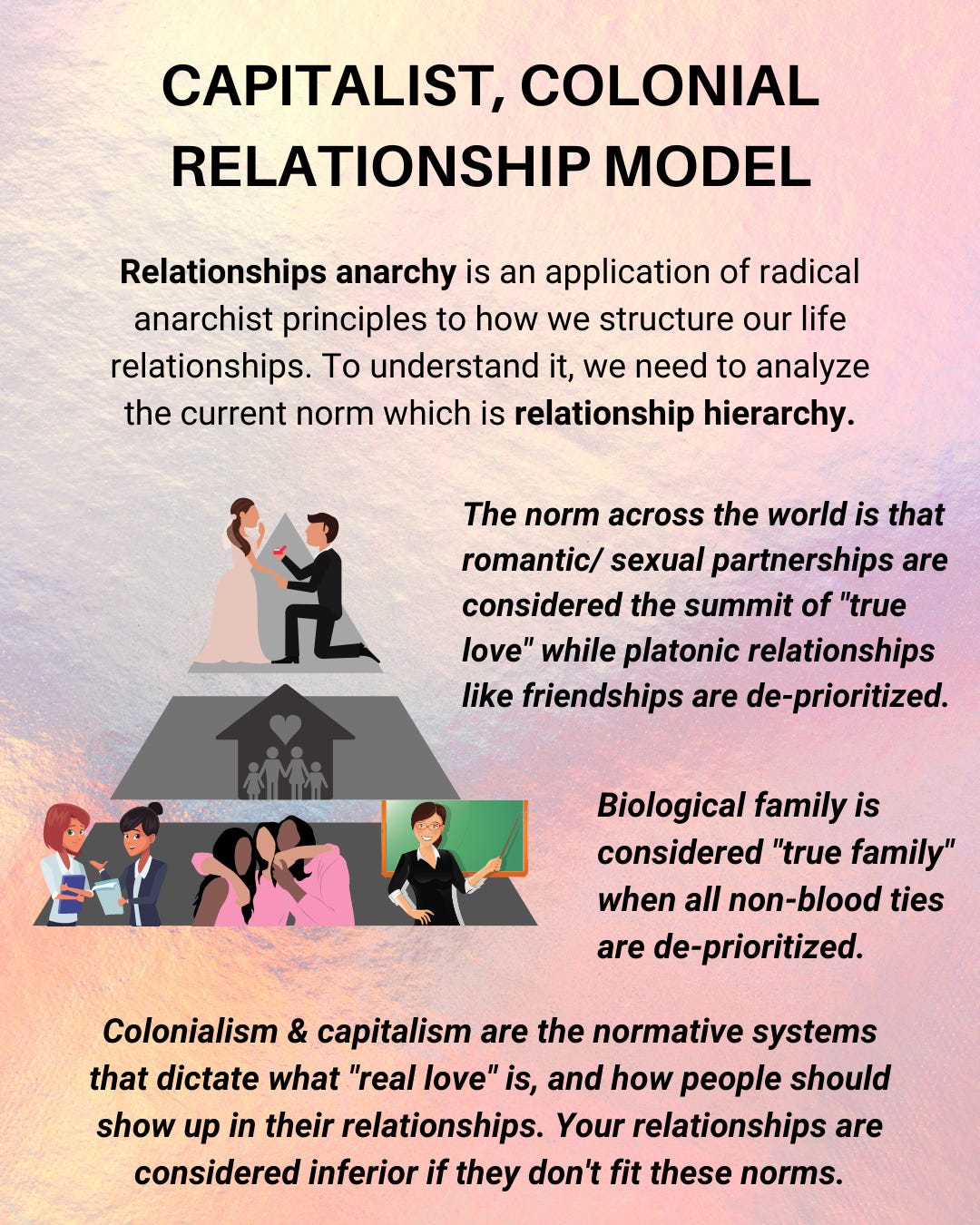Advice bridging science and social justice
Edition I of the Anonymous Advice Column
I get lots of DMs and emails with important, insightful questions from folks navigating life problems, relationships, and the burdens of capitalism. I realized all of us grappled with the SAME overarching questions with the same repeating themes and we would all benefit from answers by sharing stories and resources. So here we are—
Each edition I will pick 2-3 questions and attempt to answer them through an abolitionist anarchist lens. This first couple of editions will be fully open access & in the future:
The short TLDR answers will be open access. Paid subscribers will get access to the detailed answers with attached resources and references plus a video response of me.
I may not have a detailed solution to every crisis. I am not telling you how to live your life- I don’t have the full context to address every front either. The goal is to guide you in self-reflection as you apply your radical politics to your daily life and relationships. I sincerely believe every question is valuable to US ALL even if at first glance it might not seem relevant. Our struggles are shared and so is our path to collective liberation.
The more detail, the better!
Before I dive into the questions, I wanted to let y’all know that me and my homie Jess Meadows JUST launched something-
And our intro is pretty badass —
Dive into our first episode- Pathologize me, Tiktok- out now, also available on Spotify & Apple Podcasts!
Question:
Hey Ayesha, thank you so much for the work that you do. An issue I’m struggling with is my friends and family since I am a radical leftist/anarchist but all of my close friends and family keep justifying neoliberalism and don’t really understand me when I talk to them about anarchy and abolishing carceral systems and how diversity and inclusion isn’t actually a good thing. They mean so much to me yet I feel the gap between my values and their values is widening so much but I can’t abandon the people around me since they’re so important to me and have helped me through so many hard times and situations. How do you recommend leftists/anarchists go about handling their relationships with their close friends and family when they don’t agree with/understand radical leftist values? Thanks.
Short answer:
Everyone has their own journey to radicalizing and “waking up” from the matrix and it is nonlinear, complex and some may never “get it”. Either way- there are a million environmental variables, past trauma, ongoing systemic oppression, and relational dynamics in addition to their individual accountability that shape when and how one politically awakens. We were all neoliberal at some point and should self-reflect on the factors that led to our awakening- a lot of it is community support and pure luck. Political praxis includes being humble, not looking down on folks who don’t align with us politically or using our moral superiority to drive our interactions. We can provide support and resources but we cannot force people to evolve- that is a decision only they can make. The most any of us do is practice our politics in our own daily life and use them to guide our actions and behaviors. The greatest form of education we can do is embodying our political values.
The full answer:
Hi friend, firstly- this question resonates with many of us because as we politically awaken we have to still deal with complexities of our relationships and engage with the capitalist matrix for survival. Many of us lack the privilege to unplug from the matrix daily and are bogged down by our 9-5 jobs, monotony and unfulfilling relational dynamics. The fact is though that we have agency in the relationships we invest our time, energy and labor in. You are a collaborator and an active participant- relationships don’t happen to you. It takes two to tango and yes, often, there are power dynamics at play which is why the goal is to be in as many equitable reciprocal relationships as possible.
How did you wake up to realizing how oppressive systems work? You are a product of your community and experiences. Can you use this insight to be more self-aware about how your loved ones might have their own unique trajectories?
I personally am grateful to many community members who led with compassion and were patient with me as I stumbled past neoliberalism into more radical politics. I would have never radicalized on my own and my most valuable political education did not come from reading books- it came from observing my mentors, senior grassroots organizers, learning from my friends and being open-minded to someone’s criticism of me. A lot of my learning came from people supporting me through my discomfort and shock when I hit cognitive dissonance and realized how wrong I was before.
You cannot do the work for them. You can show up authentically, however, and choose to disengage from inequitable toxic dynamics. If someone is open-minded, you can give them resources so they can start their unlearning. However, there is aN innate “holier than thou” lens in trying to “convert” everyone to align with you politically even if they are resistant to change. I did this a lot but now I realize- I choose how invested I am in supporting folks through their unlearning as opposed to shoving my politics down their throat.
You have to decide if you can accept your loved ones for who they are TODAY, and not project the idealized image you have of them to push them to change. Of course, you cannot abandon everyone who you disagrees with you but I want you to push past the binary thinking of categorizing people as “good/ bad”. Are there people who may not be fully aware about geopolitical intricacies but they show up for you, support you, and invest in their community? Do they seem to care for others and be open to feedback and growth? Then maybe they are worth your time. You choose who you invest in.
Most importantly, we are not self-made, we are community-made. Our awareness is a direct result of all of the time, energy and labor invested into us by many people. Maybe you can serve a similar role to certain people who are on the right trajectory.
Many times we judge folks for not having all the leftist/ anarchist/ abolitionist “jargon” down and think they don’t understand anything. Superficial jargon and flexing of political knowledge is not synonymous with being liberation minded. It is also on you to learn their experiences and understand their systemic and personal trauma to maybe connect over shared experiences and collective struggles- we have more in common than you think.
Have you reflected on what your core political values are, why you believe in them, what exactly led you to arrive at these “aha! moments” and how you apply your politics in your daily life and relationships? Often, folks think knowing about politics is synonymous with being self-reflective and being a good communicator. It took me years to fully understand WHY and WHY I believe in and then be able to converse with ANYONE about it regardless of their background or prior knowledge.
Political movements can be ableist in how reliant we are on jargon/ big words, books, and we need to really ask ourselves are our movements accessible? I had to ask myself- do the most marginalized Black and Brown communities that we claim to fight for understand our political ideas? Does my grandma even get what I’m talking about?
Political awareness and personal growth are one and the same- and it is a life-long journey and commitment, not a final destination where our political awakening ends. You might have basic foundations about abolition or anarchy but you have a lifetime to learn about praxis. We all do which humbles us all.
The most important way you can “raise awareness” about your political values is by embodying them in your daily actions and relationships. We can never separate the political from the personal- when people engage with you in community and observe the impact you have, they learn about your values. Strong relationships make up strong communities and self-sustainable communities are less dependent on the state to provide for their needs.
Lastly, ask yourself, why do you need people to agree with you? Do you seek validation as a result of a lifetime of being invalidated, silenced, and repressed in certain family dynamics? Have you examined if each of the relationships that you are deeply invested in is equitable and reciprocal in that an equal amount of time and energy are put in by both sides and you receive just as much support as you give? Are you able to authentically show up as your full self in these dynamics?
Many times we conflate our worth with being understood and liked by everyone and that is impossible. Often times, we repeat patterns from our childhood and our interactions with family and friends are shaped by the our coping mechanisms under systemic and interpersonal trauma. For example, I have people-pleasing tendencies and used to pursue validation from people who degraded or disrespected me because it was a similar script from my childhood and I was hoping the outcome would be different this time. Take a step back, spend time prioritizing addressing your trauma if possible, evaluate your relational dynamics and the roles YOU take on. You don’t need EVERYONE to agree with you or validate you for you to build community.
Question:
I really want to be in a romantic relationship but I can't seem to find someone who's a good fit. I'm torn between how to feel about it, do I need a relationship to be fulfilled? Is it okay for me to need that or a similar level of connection? Should I focus on myself first or both at the same time? I appreciate any insight you have <3
Short answer:
Humans are a collectivist species and in addition to food, water, shelter, community care and love are our basic survival needs. The process of finding and building community in the capitalist matrix is complicated by hierarchies, power structures and the trauma we are face to varying degrees. We as individuals are the atoms, and our relationships are the bonds that make up communities. Strong communities require strong relationship networks. However, we’ve been socialized to believe in toxic models of hierarchical love that put romance/ sexual intimacy on a pedestal and de-prioritize other forms of love. We’re socialized with cis-heteropatriarchal norms and end up seeking an idealized version of a partner instead of being authentic in how we show up and being open to getting to know people without forcing them to fit a mold. The more we awaken politically, divest from capitalist/ colonial norms, invest in building community (with various, equally important forms of love)- the closer we get to being fulfilled and content.
The full answer:
Firstly, this is a question all of us have asked at some point. We need community to survive and thrive and romantic love can be an integral part of that for many. I want you to know that it is only natural to seek romantic partners who are aligned with our core values and not a deficit in your self-worth if you do so. However, I want to push you to decentralize your sources of love and support to build a nuanced community that doesn’t place romantic love as the greatest form of love on top of a hierarchical relationship pyramid. Intimacy and connection exist in different forms.
This model fundamentally doesn’t work- and fractures our communities. It is also a prime example of how our relationships do not embody our political values. The consequences of looking for romantic love in this context:
It devalues critical relationships like friends, mentors, etc that don't fit classical heteropatriarchal gender norms or nuclear family norms & places impossible expectations on certain relationships based on a society's arbitrary labels.
People feel obliged to exist in relationship dynamics & do what they think they "should" do rather than intentionally communicating. It also enables & retains abusive relationships especially within immediate family purely out of obligation.
Relationship anarchy is the abolition of hierarchies where all our close relationships are considered different but equally valuable dynamics where the "intensity" or "magnitude" of love is not variable. No dynamic is prioritized over another in terms of our commitment, dedication, loyalty or dedication of our energy, resources & time. Two people should not be bound by any rules in a relationship besides the ones they mutual agree upon.
You can learn more about relationship anarchy from my post on the basic foundations or this manifesto that breaks down the concept. Here is a list of additional resources from the anarchist library.
Working on yourself is an eternal life-long process of self-acceptance and growth. We need community to not just support us through this but also be the igniters of change in us as they hold us accountable with love and compassion. It is critical for your to understand your childhood, your family dynamics and past and how it shapes your adult relationships and behaviors.
We all face trauma to varying degrees and develop coping mechanisms to survive under systemic oppression. Building self-awareness on this can help us reclaim a bit of power and agency we have in choosing how we want to engage with systems. Depending on your level of marginalization and privilege, you will be able to divest from capitalism in certain ways and not in other ways for survival- but your political awakening and personal growth hinge on this self-awareness.
Often, we seek romantic love because we think it will fill a void within us which it won’t but receiving love in any form even platonically can help us regain our self-worth, feel more self-assured and help us see that we deserve to be loved as we are if we are willing to always grow. We need others- but we need a lot of complex forms of bonds, not just romance.
I think you will experience a lot of healing by investing in building all forms of love- intimate friendships, finding mentors in your niches that can guide you, folks you can organize with to improve the material conditions of your community, etc. These are all forms of love that will uplift you as you show up for others as well.
One person can never be your EVERYTHING and no one is “THE one” for you. There is no single soulmate out there for you and sustainable, healthy, romantic love is not “found” by chance, it is built with dedicated work put in by all parties involved. It requires each party to be well supported by others in their support system.
There will be multiple people you are initially compatible with and the rest involves a commitment from all parties to collaborate on growing and exploring the possibilities of liberation together. It requires us to de-center our ego and divest from transactionality. We show up for someone we care about not expecting something in return but simply because we want to see them happy and fulfilled.
Relationships under capitalism can become transactional (breeding long-term resentment) and possessive in that we look at other people as something to “own” because capitalism socializes us to be materialistic. We spend our life aspiring to trophies because we think we will be perceived as “successful” or valued but that never works because it logically doesn’t make sense.
So think about what you truly want from life that would make you happy (to the extent that is possible under capitalism), is it merely having career titles, academic success, more money, a relationship that is “socially acceptable”, or is it something deeper? What gives you joy in your daily life? Remove all social constructs from this- money is not real, neither is a career, the concept of marriage, the idea that you HAVE to have kids, etc. These are all social constructs and just because someone told you you have to live this way doesn’t mean it’ll fulfill you or fit with your political values.
Bottomline: focus on understand yourself, self-reflecting, addressing your trauma, building meaningful authentic friendships, being in community etc just as much as you’d focus on finding a romantic partner. The best you can do is set yourself up for meeting liberation minded people by being in community as much as possible, working on yourself, finding ways to experience more joy, ground yourself in what is real while divesting from social constructs and leave the rest to the universe’s cosmic probability.
That is all for now.
In tangible solidarity always,
Ayesha.











I would love to understand better, what's the relationship between abolitionist and anarchist thoughts and "diversity and inclusion"?